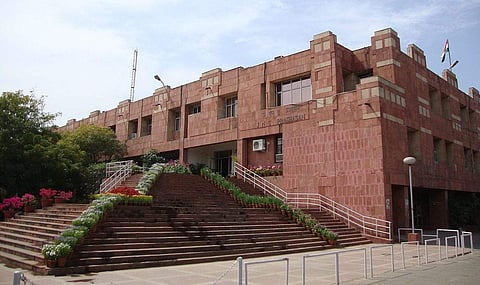

Professors across Central Universities in the country are sending mass emails to the President of India to convince the UGC-MHRD to not impose the Central Civil Service Conduct rules on them. According to the circular sent out to the Universities 'the concerned University formulates its Statutes, Ordinances, and Regulations, for service matters, the University should follow the Govt of India rules/orders as applicable to Central Govt. Civilian employees.’
A lot of professors have come out strongly against the new rule, claiming that it goes against their fundamental beliefs of what teaching should be. They claim that they are in no way similar to government servants and cannot be forced to adhere to the same sort of rules. The professors are hoping that this mass e-mail campaign will help push the UGC to change their decision because the same had happened when the professors had written to the UGC to modify some aspects of the Draft Regulations of 2018.
In the letter, the professors make four specific points for why the imposition of the CCS is a bad idea.
1. Rule 8 (i) states that “No employee shall, except with the previous sanction of the University, own wholly or in part, or conduct, or participate in the editing or management of any newspaper or other periodical”. Rule 8 (ii) prohibits the publication of books and articles save for a purely scientific or literary character. Rule (9) makes it clear that all such intervention must not be of a nature that “has the effect of an adverse criticism of the Government” or embarrass relations with the Union or with any foreign government.
The letter says that with this rule, Indian academics will not be able to engage in, and with, critiques of government policy, and will also not be able to fulfill their professional duties freely— editorships and membership of editorial boards. Rule 9 will deprive teachers of the opportunity and moral obligation to inform and influence public opinion, an essential role of academia, and the chief way in which it can give back to society.
2. Rule 5 bars all political participation and activity, beyond voting by the teacher and his family. For example, Rule 5(1) maintains that “no employee shall be a member of, or be otherwise associated with any political party or any organization which takes part in politics, nor shall he take part in, subscribe in aid of, or assist in any other manner, any political movement or activity”.
The application of this rule would mean that central university teachers must, in order to preserve their jobs, renounce principled subscription to political parties, any organization that takes part in politics, political movements or activities, and thus bars them from contesting elections. Not only will this entail a great loss to our democracy — over the last seven decades many academics have brought great lustre to our country’s political firmament — it makes sacrifice of fundamental rights under Article 19 a precondition for employment.
In university governance, this rule has the power to legitimise witch hunts, given that university administrators are appointed by the ruling party. It should also be kept in mind that for many backward sections, particularly SCs, STs, OBCs, employment in education provides the necessary social and economic capital for entry into public life. This rule therefore amounts to shunting out academics from the task of building cultures of constitutionalism and equality. The blanket caution against “any political movement or activity” would mean that teachers’ participation in mass rallies or collective mobilisations – even of the nature recently witnessed around the Nirbhaya rape case – might now constitute a breach of service rules and thus invite punishment.
3) Rules 6 and 7 allow university administrations to define what is prejudicial and contrary to national interest, public order, decency or morality. Rule 6 states that “no employee, teaching or non-teaching, of the University shall join or continue to be a member of an association, the object or activities of which are prejudicial to the interests of the sovereignty and integrity of India, public order, decency or morality”. Rule 7 prohibits participation in any demonstration or strike for the same reasons.
The apprehension with this rule is that University administrations will be empowered to label any act as ‘misconduct’, based on subjective and partisan appreciation of these terms.
Universities are breeding grounds for social reform, where social change is incubated. However, armed with this rule, even a faculty member who is part of a women’s collective or who writes a joint representation against gender based discrimination could be treated as guilty of misconduct, in its being contrary to a conservative university administration’s ideas of morality or decency. The net result would be a chilling effect on free speech, and will deprive teachers of the means to alert the government and Parliament to violations of policies and laws by university administrations.
4) Rule 10(1) states that “no employee shall except with the previous sanction of the University give evidence in connection with any inquiry conducted by any person, committee or authority”. Rule 10(2) makes it clear that even if sanction is obtained, it will be only for evidence or opinion that is not critical of the government. Rule 11 prohibits faculty from sharing unauthorized information with other colleagues and the public except when ordered to do so, or when the information is shared in good faith to discharge duties. Rule 12 prohibits faculty from raising funds, ask or accept subscriptions to funds or associate with fund raising in cash or kind for any object whatsoever.
Citing these reasons, the professors are requesting for the immediate withdrawal of the rule. The letter is being passed around to professors across the country urging them to copy paste the text of the letter and address it to the President whom they refer to as - The Visitor.
The UGC has not yet commented on emails.
Read the full letter here: https://betteruniversities.in/2018/10/22/ccs-implementation-in-central-universities-a-death-blow-to-academic-freedom/
